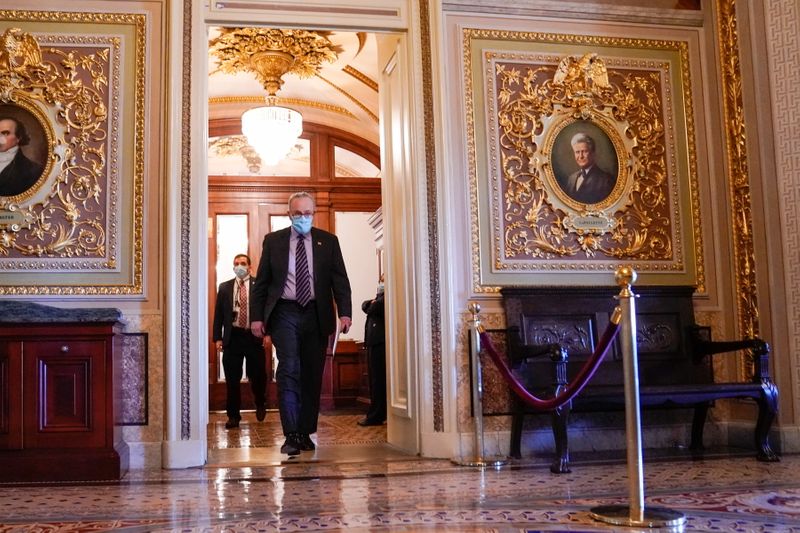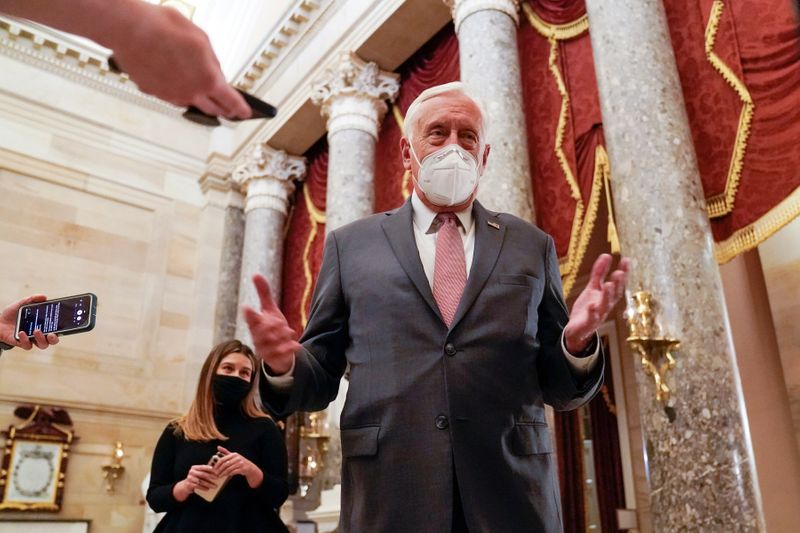By Susan Cornwell and Richard Cowan
WASHINGTON (Reuters) -Negotiations in the U.S. Congress over final details of a $900 billion COVID-19 aid bill could spill into the weekend, requiring another stopgap spending bill to avert a looming government shutdown, Republican Senate Majority Leader Mitch McConnell said on Thursday.
Top Republicans and Democrats were closer than ever to producing a fresh round of aid to salve the heavy human and economic toll of a pandemic that has killed more than 300,000 Americans and is worsening as the winter approaches.
Congress must either approve a coronavirus aid bill riding along with a $1.4 trillion government funding measure or pass a third stopgap funding bill by midnight Friday. Otherwise, federal agencies will be forced into shutting down many of their operations for a lack of money, a crisis that both parties want to avoid.
"If we need to further extend the Friday deadline ... I hope we'll extend it for a very, very short window of time," the Republican leader said.
Indicating that there still was work to be done in coronavirus aid negotiations, McConnell said, "We're near the point in this process where we decide if we're going to stay on the fast-track or drift back toward business as usual."
"We made some progress this morning and we’re waiting to hear back" from the other side, House of Representatives Speaker Nancy Pelosi, a Democrat, told reporters in the Capitol.
The coronavirus legislation is expected to include stimulus checks of about $600, extend unemployment benefits, help pay for vaccine distribution and assist small businesses struggling in a crisis that has killed more than 304,000 Americans and thrown millions out of work.
The top two Democrats in Congress - Pelosi and Senate Democratic Leader Chuck Schumer - held a late-night talk with Treasury Secretary Steven Mnuchin, an aide to Pelosi said on Twitter.
Congress passed $3 trillion in economic aid last spring, but lawmakers have argued ever since about how much more may be needed. With rates of COVID-19 infections soaring to new highs, and with the American economy showing signs of weakening, leaders of both parties in the House of Representatives and the Senate this month began to compromise in hopes of passing a bill.
House Majority Leader Steny Hoyer, a Democrat, said negotiators were still haggling over emergency aid for nutrition programs, which are stretched during the coronavirus pandemic that has left millions unemployed.
STICKING POINTS
The rough outlines of the legislation emerged from various lawmakers' accounts, but negotiators and aides were still working on several sticking points.
Two contentious issues appear to have been left by the wayside. The measure was not expected to include a dedicated funding stream for state and local governments, which has long been a Democratic priority but opposed by Republicans, or new protections for companies from lawsuits related to the pandemic, something high on the Republican agenda.
But an argument broke out over whether to increase reimbursements from the Federal Emergency Management Agency to local governments for expenses related to COVID-19, like personal protective equipment for schools. Republicans were wary.
"If it’s simply a way of disguising money for state and local governments, we’ll have a lot of opposition," said the Senate's No. 2 Republican, John Thune.
Thune said the proposed direct payments to individuals would be around $600 to $700 per person, roughly half the amount lawmakers approved last spring. Some lawmakers such as Senator Bernie Sanders, an independent who caucuses with Democrats, were pushing for more.
Lawmakers were discussing $300 weekly in federal unemployment benefits - which would also be half the amount passed last spring, that expired in the summer - and about $330 billion to help small businesses, Thune said.

The $900 billion price tag for the package partially would be paid for by more than $400 billion in repurposed funds from other parts of the budget, McConnell said.
